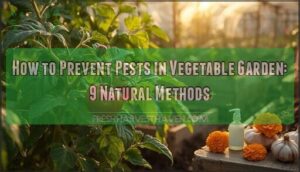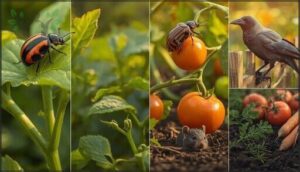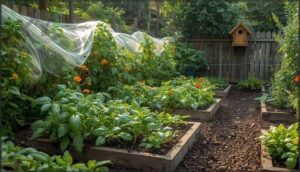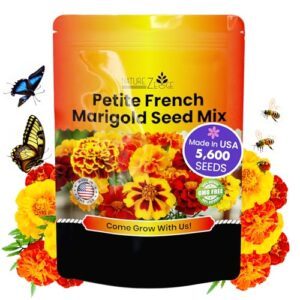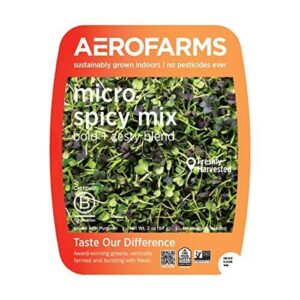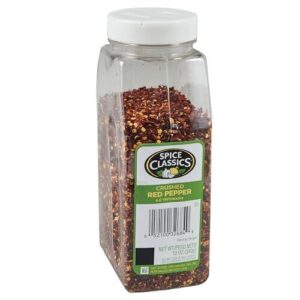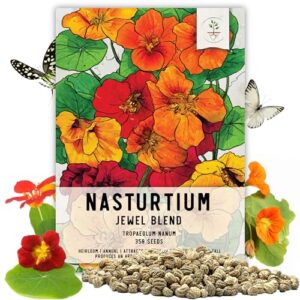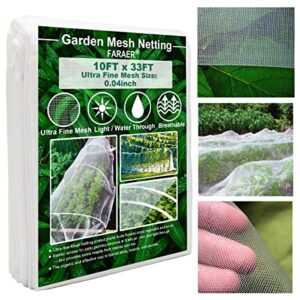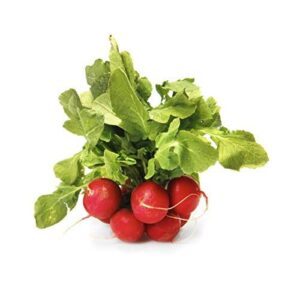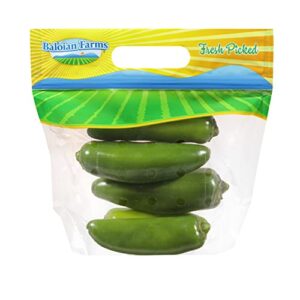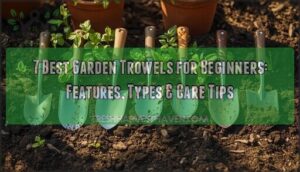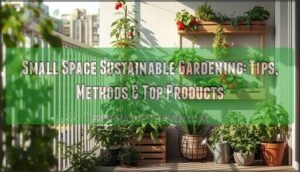This site is supported by our readers. We may earn a commission, at no cost to you, if you purchase through links.
Last summer, a single batch of Colorado potato beetles wiped out 40% of my neighbor’s tomato plants in just six days. She’d spotted the telltale orange eggs weeks earlier but assumed they were harmless—a costly mistake that turned her August harvest into a scramble for farmers’ market replacements.
The truth is, most garden pests don’t announce themselves with fanfare. They work quietly, systematically, and by the time you notice the damage, they’ve already invited their extended families to the feast. Understanding how to prevent pests in vegetable garden spaces means recognizing early warning signs and building defenses before invaders establish strongholds.
The good news? Nine proven natural methods can transform your garden from an all-you-can-eat buffet into a fortress that protects your harvest without relying on harsh chemicals.
Table Of Contents
- Key Takeaways
- Common Garden Pests and Their Damage
- Natural and Organic Pest Prevention Methods
- Building a Healthy, Pest-Resistant Garden
- Attracting Beneficial Insects for Pest Control
- Top 9 Products to Prevent Garden Pests
- 1. NatureZ Edge Marigold Seeds Mix
- 2. AeroFarms Spicy Microgreens Arugula Mustard
- 3. Crushed Red Pepper Seasoning Flake
- 4. Jewel Mix Nasturtium Edible Flower Seeds
- 5. Fine Mesh Garden Plant Netting
- 6. Snail Protection Plant Covers Set
- 7. Scott Comfort Plus Toilet Paper
- 8. Fresh Organic Red Radish Bunch
- 9. Fresh Jalapeno Peppers Pack
- Frequently Asked Questions (FAQs)
- How do I keep my vegetable garden pest free?
- What is the best pest control for vegetable garden?
- How do I stop bugs from eating my vegetables?
- How do I keep critters out of my vegetable garden?
- How to keep critters out of a vegetable garden?
- What is a natural pest repellent for vegetable gardens?
- How do I stop bugs from eating the leaves of my plants?
- How do I keep bugs away from my vegetable garden?
- What is the best pest control for vegetable gardens?
- How do people control pest problems in vegetable garden?
- Conclusion
Key Takeaways
- Combining multiple natural methods—companion planting with aromatic herbs, physical barriers like row covers (65-75% pest reduction), and beneficial insect attraction—creates a layered defense system that protects vegetables without chemicals while maintaining garden ecosystem balance.
- Soil health forms your frontline defense: adding 2-4 inches of compost annually builds beneficial microbes that suppress diseases by 50%, while proper crop rotation cuts soil-borne pest populations by 40-60% and disease incidence by 40%.
- Early detection through daily scouting prevents minor issues from becoming infestations, since most garden pests work quietly and systematically—by the time visible damage appears, populations have already established strongholds that require aggressive intervention.
- Physical exclusion barriers deliver measurable results when installed correctly: floating row covers reduce pest damage by 65-75% and boost yields up to 14%, while fine mesh netting (0.8mm) can increase marketable yield over 200% compared to chemical treatments alone.
Common Garden Pests and Their Damage
Before you can protect your garden, you need to know what you’re up against. Insects, birds, and rodents each leave distinct calling cards—from chewed leaves to missing seedlings.
Understanding these pests and recognizing their damage helps you choose the right prevention strategy before problems spiral out of control.
Identifying Insect, Bird, and Rodent Pests
Recognizing who’s visiting your vegetable garden comes first. Over 600 insect species can threaten crops globally, though you’ll likely encounter fewer than 100 regularly in your area. Colorado potato beetles, flea beetles, and cucumber beetles rank among the most common culprits.
Don’t overlook birds like crows and sparrows targeting ripening fruits, or rodents—particularly voles and mice—causing up to 13% yield loss seasonally.
Understanding garden pest control is vital for a healthy harvest.
Signs and Symptoms of Pest Damage
Leaf damage signs appear first—chewed edges, yellowing, or curled foliage signal active feeding. You’ll spot large holes from beetles or slugs in over 40% of infested plots, while soft spots on fruits hint at sap-sucking pests. Check for visible excrement beneath leaves; it’s present in roughly 33% of caterpillar cases. Root damage causes wilting in about 15% of gardens, often from hidden borers attacking underground.
To address these issues, understanding pest control methods is vital for garden health.
Why Pest Management is Essential
Without effective pest management, your garden faces yield losses averaging 21.5% to 30.3% across major crops—and vegetables can lose up to 40% to insects alone.
Without pest management, gardens lose 21.5% to 40% of their harvest—vegetables suffer the worst damage from insects alone
That’s why integrated pest management and organic gardening practices matter. They protect crop yield, support ecosystem balance, and safeguard food security while promoting environmental sustainability through natural pest control methods that work with nature, not against it.
Natural and Organic Pest Prevention Methods
You don’t need harsh chemicals to keep pests at bay—nature provides plenty of effective tools on its own. From strategic plant pairings to simple physical barriers, these methods work with your garden’s ecosystem rather than against it.
Let’s explore four proven approaches that protect your vegetables while keeping your garden healthy and balanced.
Companion Planting for Pest Control
Companion planting transforms your garden into a living defense system. When you pair marigolds with tomatoes or plant basil alongside peppers, you’re creating natural barriers that confuse and repel pests while attracting beneficial insects like ladybugs and parasitic wasps.
These organic gardening methods reduce pest damage by 40–80% in some systems, turning companion planting for pest control into your first line of natural pest management.
Using Physical Barriers and Row Covers
Physical barriers create a fortress around your crops without chemicals. Floating row covers—lightweight garden mesh that sits over plants—cut pest damage by 65–75% in field trials and boost yields by up to 14%. You’ll want to match your garden mesh sizes to the threat: medium-density (20–50 mesh) balances airflow with protection, while finer nets stop tiny invaders like thrips.
Three crop protection methods deliver results:
- Install covers immediately after planting to exclude pests before they arrive
- Use hoops or frameworks to prevent mesh from touching foliage
- Combine with reflective mulch for an 87% reduction in whiteflies
These physical exclusion techniques pay for themselves across 3–5 seasons, making pest barrier types like fruit protection bags and DIY traps smart long-term investments in natural pest management.
Repelling Pests With Aromatic Herbs
Smart herb garden planning doubles as defense—aromatic oils from basil, mint, rosemary, and lavender disrupt pest feeding and confuse their host-finding radar. These pest-repellent plants form a living shield when positioned within 20–30 cm of vegetables.
Integrate these natural insecticides with organic gardening tips like companion planting for layered protection.
| Herb | Primary Targets |
|---|---|
| Basil | Aphids (40% reduction), mosquitoes |
| Marigolds | Nematodes, aphids (50% decline) |
| Mint | Aphids, beetles, caterpillars |
| Rosemary | Cabbage worms (60% disruption) |
Mechanical Removal and Hand-Picking
Hand Picking delivers an 87% success rate against garden pests when you scout daily during vulnerable life stages. This Pest Removal technique works best on visible targets like hornworms and squash bugs, reducing pesticide use by 50% when combined with Mechanical Barriers.
- Inspect undersides of leaves during morning Pest Inspection rounds
- Remove egg masses before larvae emerge—timing beats chemicals
- Wear gloves when handpicking sap-exuding insects to protect skin
Building a Healthy, Pest-Resistant Garden
The strongest defense against pests starts long before you spot the first aphid on your tomatoes. When you build sturdy plant health from the ground up, your vegetables naturally resist damage and bounce back faster from attacks.
Let’s look at three foundational practices that turn your garden into a fortress without relying on sprays or complicated treatments.
Soil Health and Organic Amendments
Your soil is the frontline defense against garden pests. When you add 2-4 inches of compost annually, you’re building an army of beneficial microbes that suppress diseases by up to 50%. Organic matter improves water retention by 25-35%, keeping plants resilient under stress.
Here’s how different amendments strengthen your pest-resistant garden:
| Amendment | Key Benefit |
|---|---|
| Compost | Increases beneficial bacteria 20-30%, reducing root rot |
| Biochar | Suppresses soilborne fungi by 86%, nematodes by 50% |
| Organic matter | Improves water infiltration, cutting drought stress 25-35% |
| Manures | Creates microbial guilds that degrade pathogens naturally |
| Humic substances | Maintains soil structure, fosters deeper root growth |
This natural approach to soil health means you’re not just feeding plants—you’re cultivating an ecosystem where pests struggle to gain a foothold.
Crop Rotation and Garden Sanitation
Rotating your vegetable families each year cuts soil-borne pest populations by 40-60% and slashes disease incidence by 40%. When you alternate heavy feeders, legumes, and cover crops in four-year cycles, you’re breaking the life cycles of specialized pests.
Pairing this with thorough garden cleanup—removing all plant debris and weeds—boosts your integrated pest management effectiveness up to 17-fold, preventing pathogens from overwintering.
Proper Watering and Fertilization Practices
Consistent watering—1 to 2 inches weekly—keeps your plants strong and pests at bay. Deep irrigation once a week encourages sturdy roots while discouraging surface-dwelling insects.
Pair this with balanced fertilizer scheduling based on soil tests, and you’ll avoid the nitrogen overload that attracts aphids.
Drip irrigation methods conserve water, reduce fungal issues, and when combined with compost mulching, create the foundation for effective natural pest control and thriving organic gardening.
Attracting Beneficial Insects for Pest Control
Not every bug in your garden is a problem—some are working for you, not against you. By creating the right conditions, you can recruit an army of natural predators that keep harmful pests in check without any chemicals.
Here’s how to turn your vegetable garden into a haven for these helpful allies.
Planting Flowers to Attract Predators
Diversity makes all the difference when attracting beneficial insects for natural pest control. Plant at least nine different flower species—Ammi majus attracts 14 parasitoid and 9 predator families, while globe amaranth and culinary herbs like dill pull in ladybugs and lacewings.
This companion planting approach can reduce pest populations by 73%, creating ecosystem balance that extends up to 40 feet from your flower strips.
Installing Insect Hotels and Pollinator Strips
You can boost beneficial insect attraction by setting up insect hotels near nectar-rich flower banks—they’ll reach 27% occupancy on average and draw native bees, solitary wasps, and predatory insects that keep pests in check.
Pair them with pollinator strips to increase pollinator visits by 25% and reduce pest damage by 61%.
This ecosystem balance approach delivers natural pest control methods while supporting garden biodiversity through ecological gardening practices.
Avoiding Broad-Spectrum Pesticides
While building habitat for beneficial insects, you’ll want to protect them by steering clear of broad-spectrum pesticides—these products harm predators alongside pests, triggering pest resistance and disrupting your sustainable gardening ecosystem.
Instead, lean on organic methods like neem oil or diatomaceous earth within an integrated management framework. This eco-friendly approach preserves natural pest control methods while keeping organic gardening techniques effective for the long haul.
Top 9 Products to Prevent Garden Pests
You don’t need to rely solely on techniques and strategies to keep pests at bay. The right products can make your pest prevention efforts more effective and save you hours of trial and error.
Here are nine practical items that support a natural, balanced approach to protecting your vegetable garden.
1. NatureZ Edge Marigold Seeds Mix
NatureZ Edge Marigold Seeds Mix offers an evidence-based solution for natural pest prevention, with roots that secrete alpha-terthienyl to block nematode development.
You’ll get over 5,600 GMO-free seeds that attract beneficial insects like ladybugs and lacewings while deterring aphids and whiteflies.
Plant these pest-resistant seeds at least two months before vulnerable crops for maximum nematode control.
The compact blooms boost companion planting strategies in your organic gardening techniques, creating borders that reduce pest populations while supporting garden integration with tomatoes, cucumbers, and beans.
Best For: Organic gardeners seeking a science-backed companion plant that reduces nematodes, aphids, and whiteflies while attracting beneficial insects to vegetable beds.
- Roots release alpha-terthienyl, a compound proven to block nematode egg development and reduce root galls in tomatoes and other crops when planted two months before vulnerable plants.
- Over 5,600 GMO-free seeds germinate quickly (8-10 days) and attract policing insects like ladybugs and lacewings that naturally control aphids and beetles.
- Works as both a pest deterrent and trap crop for slugs and snails, with measurable reductions in whitefly populations documented in university research when intercropped with vegetables.
- Requires strategic timing and placement for pest control—must be planted at least two months ahead of susceptible crops for effective nematode suppression.
- Limited effectiveness against larger pests like deer, rabbits, and groundhogs despite some popular claims suggesting otherwise.
- Some users report receiving incorrect marigold varieties or weak plants, and flowers can attract 15 insect pests including aphids and Japanese beetles that may need additional management.
2. AeroFarms Spicy Microgreens Arugula Mustard
AeroFarms Spicy Microgreens Arugula Mustard brings vertical gardening innovation directly to your plate, offering pest-free produce grown without synthetic pesticides. These indoor farming microgreens—blending arugula, mustard, and red bok choy—deliver concentrated nutrients while bypassing field-based pest management strategies entirely.
Though you can’t use them as biological pest control in your garden, their ready-to-eat convenience fosters sustainable harvesting practices.
The bold, peppery flavor enhances organic gardening techniques by encouraging you to grow diverse, nutrient-dense crops that naturally resist pests through companion planting and healthy soil.
Best For: Home cooks and health-conscious eaters who want nutrient-dense, ready-to-eat greens with a spicy kick, grown sustainably without pesticides.
- Packed with up to 5 times more vitamins than mature greens, giving you serious nutrition in a small package.
- Grown indoors with 95% less water and no pesticides, so you get clean, eco-friendly produce year-round.
- Bold, peppery flavor works as both a salad base and a finishing garnish—versatile enough for everyday meals or special dishes.
- Short shelf life means you need to use them quickly after opening, which isn’t ideal if you shop infrequently.
- At 2 oz per pack, the portion is small and may not stretch far for larger households or multiple servings.
- Some users still prefer to wash them before eating, despite the ready-to-eat label, adding an extra step.
3. Crushed Red Pepper Seasoning Flake
Crushed red pepper seasoning flakes harness capsaicin effects to disrupt mammalian pest behavior in your garden. You can sprinkle these flakes around vulnerable plants or steep them with garlic to create red pepper sprays that work as organic repellents.
Capsaicin concentrations between 15,000–30,000 Scoville units deter squirrels and rodents by triggering irritant responses, but garden applications wash away quickly with rain. These pest deterrents require frequent reapplication and won’t eliminate insect infestations outright.
They are most effective within broader natural pest prevention and control strategies that maintain garden ecosystem balance.
Best For: Gardeners looking for an affordable, non-toxic mammal deterrent to protect bulbs and beds from squirrels and rodents, who don’t mind frequent reapplication after rain.
- Capsaicin triggers aversive responses in squirrels, rats, and other digging mammals at concentrations found in standard crushed red pepper, offering a chemical-free alternative to poisons.
- Widely available in grocery stores at low cost, making it an accessible first-line defense that can be sprinkled directly on soil or mixed into homemade garden sprays.
- Safe for birds and beneficial insects when used as directed, allowing seed-eating birds to visit treated areas without harm due to their lack of capsaicin sensitivity.
- Washes off quickly with rain or irrigation, requiring constant reapplication to maintain any protective effect and increasing the labor involved in garden maintenance.
- Limited impact on insect pests like aphids and caterpillars, with studies showing only 30–40% reductions in some cases, so it won’t solve serious infestations on its own.
- Can irritate skin, eyes, and mucous membranes in humans and pets who contact treated plants or soil, requiring careful handling and potentially restricting garden access.
4. Jewel Mix Nasturtium Edible Flower Seeds
Jewel Mix nasturtium edible flowers deliver triple protection through companion planting: they trap aphids away from brassicas and cucurbits, repel squash bugs and cucumber beetles, and attract pollinators that support beneficial insects. You’ll plant these pest-resistant seeds along bed edges where their compact 12–18 inch growth creates a vibrant barrier.
Korean trials confirm nasturtiums reduced lepidopteran damage markedly compared to monocultures. Their peppery leaves add vitamin C to salads, while the bright blooms help you spot aphid buildups early—organic gardening techniques that combine natural pest prevention with multifunctional garden integration.
Best For: Organic vegetable gardeners who want a dual-purpose edible flower that naturally deters aphids, squash bugs, and cucumber beetles while attracting pollinators to brassica and cucurbit beds.
- Acts as a proven trap crop and pest repellent—Korean trials showed significantly less lepidopteran damage in companion plots, while extension research confirms deterrence of aphids, squash bugs, and striped cucumber beetles when planted near vegetables.
- Edible flowers and leaves add peppery, vitamin C-rich flavor to salads, giving you a culinary harvest from the same plants that protect your crops.
- Supports beneficial insects and pollinators through nectar-rich blooms, with studies showing flower strips reduce pest larvae by 40% and damage by 61% while boosting natural predator populations.
- Some customers report variable germination rates, and seeds can rot if oversoaked, requiring careful moisture management during planting.
- May not bloom reliably in extreme heat, cold, or frost, limiting effectiveness in regions with harsh temperature swings.
- Requires consistent watering and well-draining soil to thrive, which can be challenging in dry climates or heavy clay gardens without amendments.
5. Fine Mesh Garden Plant Netting
Fine mesh garden netting with 0.8 mm openings blocks flea beetles, aphids, and leaf miners while letting air and water through—physical barriers that beat organic sprays at their own game.
In blackberry trials, netting boosted marketable yield 2.04 times over insecticide-treated rows, producing 210 grams per week versus 103 grams.
You’ll stretch this PE mesh over hoops to avoid foliage contact, securing edges tight to prevent pest breaches. The result? Crop yield improvement without chemical runoff, keeping beneficial insects thriving outside your protected vegetable garden pest control zone.
Best For: Home gardeners and small-scale growers who want to protect vegetables, fruits, and flowers from tiny pests without using chemicals.
- Blocks small insects like aphids, flea beetles, and leaf miners more effectively than organic sprays.
- Increases marketable crop yield while allowing air, water, and light to reach plants.
- Durable, reusable, and easy to install over hoops or frames.
- May fray when cut and can be damaged by strong winds or rough handling.
- Large size can be unwieldy to manage, especially for smaller gardens.
- Not effective against larger pests like chipmunks or deer, and may restrict airflow if not installed properly.
6. Snail Protection Plant Covers Set
Colorless plastic plant covers cut snail mortality to 100% within 15 days—garden protection that transforms vulnerable seedlings into off-limits territory for hungry mollusks. You’ll position these emerald barriers around young vegetables, creating a physical defense that maintains 95% effectiveness across seasons without chemical residue.
In high-density trials, snail barrier covers slashed pest populations by 99.4% after 30 days, outperforming traditional methods while supporting organic gardening principles.
Your vegetable garden pest control strategy gains a reusable tool that withstands frost, rain, and sun while natural pest prevention stays nontoxic.
Best For: Gardeners who want chemical-free snail protection for seedlings and young vegetables while keeping their growing space organic and safe.
- Cuts snail populations by over 99% without using toxic chemicals, making them perfect for organic gardens and safe around kids and pets.
- Durable enough to last multiple growing seasons through sun, rain, and frost, with 90% of covers staying effective after a full year of use.
- Increases vegetable yields by an average of 19% by protecting plants from pest damage while still allowing water, air, and sunlight through.
- Can be too small for larger seedlings, which means you might need to size up or remove them sooner than expected.
- May become brittle and crack after one season of heavy sun exposure, especially if you’re in a climate with intense UV.
- Don’t include stakes or anchors, so you’ll need to secure them separately if you’re dealing with windy conditions.
7. Scott Comfort Plus Toilet Paper
Recycled paper cardboard acts as a rodent deterrent when shredded and layered around your garden perimeter—a biodegradable barrier that mice and voles avoid crossing.
Scott Comfort Plus toilet paper, with its FSC-certified fiber and septic-safe composition, breaks down 10 times faster than premium brands, transforming into compost-ready material that enriches soil while maintaining your pest control strategies.
You’ll integrate this eco-friendly product into garden ecosystem balance, using sustainable packaging waste as mulch that suppresses weeds and discourages burrowing pests through its texture and density.
Best For: Budget-conscious households looking for reliable, septic-safe toilet paper that balances softness with strength and won’t clog pipes.
- Dissolves 10 times faster than leading premium brands, making it ideal for older plumbing and sensitive septic systems.
- FSC-certified and 100% biodegradable with sustainably sourced fibers, so you’re making an environmentally responsible choice.
- Double rolls with 231 sheets each mean fewer roll changes, plus it’s 3 times thicker and 4 times stronger than basic value brands.
- Single-ply construction won’t feel as plush as premium multi-ply options if you prefer luxury softness.
- Some users report rolls running out faster than expected despite the double-roll sizing.
- Occasional delivery and packaging issues have been noted in customer reviews, which can be frustrating.
8. Fresh Organic Red Radish Bunch
You’ll discover that organic red radish bunches work double-duty as both crop and pest deterrent—planting them near squash cuts pest eggs by 75%, while their fast-growing foliage attracts flea beetles away from neighboring vegetables.
This radish companion strategy aligns with crop rotation principles and soil fertility improvement, acting as a natural trap crop that diverts beetles and root maggots before they target your main harvest.
Pair them with floating row covers during establishment, and you’ll create layered protection that preserves garden ecosystem balance without chemical intervention.
Best For: Organic gardeners who want fresh eating radishes that also protect companion plants from pests like squash bugs and flea beetles.
- Acts as a natural pest trap that reduces squash bug eggs by 75% and diverts flea beetles away from your main crops without chemicals.
- Arrives fresh with stems and leaves intact, perfect for salads or tossing greens into smoothies for extra nutrition.
- Supports healthier garden ecosystems when paired with row covers and companion plants like dill or yarrow to attract beneficial insects.
- Often arrives sandy or muddy and needs several washes before you can use them.
- Quality isn’t consistent—some bunches have woody textures even when they look good, and bigger doesn’t always mean better.
- Costs more than conventional radishes or bulk options, which adds up if you’re buying regularly.
9. Fresh Jalapeno Peppers Pack
Beyond radishes, hot pepper benefits extend into jalapeno pest control—incorporating this pepper companion creates natural pest prevention through capsaicin compounds that deter soft-bodied insects and larger foragers.
When planted as trap crops in border rows, jalapenos attract aphids and flea beetles away from susceptible vegetables, supporting garden ecosystem balance while preserving beneficial predators.
Combine this spice garden management approach with weekly scouting and plastic mulch to reduce aphid presence by up to 40%, reinforcing organic pest deterrent strategies without broad-spectrum pesticides that disrupt natural gardening systems.
Best For: Home gardeners who want to add mild-to-moderate heat to their cooking while using jalapenos as a natural pest management tool in integrated garden systems.
- Works as an effective trap crop when planted in border rows, drawing aphids and flea beetles away from more vulnerable vegetables while keeping beneficial insects safe.
- Fresh, crispy peppers offer versatile culinary uses—from salsas and salads to stuffed preparations—with adjustable heat levels by removing seeds and membranes.
- Supports sustainable gardening practices by reducing the need for chemical pesticides, with studies showing up to 40% lower aphid presence when combined with proper mulching and scouting.
- Heat levels can be inconsistent across batches, with some peppers arriving milder than expected due to natural variation or quality control issues.
- Requires careful handling since jalapeno oils and juices can cause significant skin and eye irritation if proper precautions aren’t taken.
- Won’t eliminate garden pests entirely on its own—effective pest control still requires regular monitoring, companion planting strategies, and integrated management techniques.
Frequently Asked Questions (FAQs)
How do I keep my vegetable garden pest free?
You won’t achieve a completely pest-free garden, but you can minimize damage through routine scouting, physical barriers like row covers, companion planting, beneficial insects, and maintaining excellent garden hygiene with regular debris removal.
What is the best pest control for vegetable garden?
The best pest control combines multiple strategies: row covers for barriers, neem oil and organic soap sprays for active infestations, beneficial insects as natural predators, and companion planting with aromatic herbs—all supported by healthy soil practices.
How do I stop bugs from eating my vegetables?
Like ancient Roman gardeners protecting their crops, you’ll stop bugs by combining garden barriers, organic sprays like neem oil, diatomaceous earth, row covers, and inviting beneficial insects—natural predators that target destructive pests while maintaining soil health management.
How do I keep critters out of my vegetable garden?
You’ll need sturdy garden fencing with buried edges to block rabbits and woodchucks.
Install row covers as pest barriers, use organic repellents like lemongrass oil, and plant trap crops to redirect critters away from vegetables.
How to keep critters out of a vegetable garden?
Physical barriers like garden fencing and mesh effectively block wildlife. Companion planting with aromatic herbs provides organic barriers, while row covers offer complete pest exclusion. Beneficial insects add natural critter deterrents, creating layered wildlife control that works.
What is a natural pest repellent for vegetable gardens?
Natural pest repellents include essential oils like peppermint and citronella, organic soap sprays, neem oil, and diatomaceous earth.
Biological controls such as beneficial insects and aromatic herbs provide nontoxic pesticides that create pest-resistant gardens without chemicals.
How do I stop bugs from eating the leaves of my plants?
Stop bugs from eating your leaves by combining strategic methods: hand-pick visible pests daily, apply neem oil or organic soap sprays, use row covers as barriers, and plant bug repellent plants like marigolds and basil alongside pest-resistant crops.
How do I keep bugs away from my vegetable garden?
You’ll keep bugs away by combining garden barriers like row covers and fine mesh with companion planting, organic sprays, and beneficial insects.
Healthy soil and diatomaceous earth strengthen your natural pest prevention system effectively.
What is the best pest control for vegetable gardens?
Integrated Pest Management combines multiple organic gardening techniques—companion planting, physical barriers, and beneficial insects—into one sustainable pest management system.
You’ll layer eco-friendly solutions like row covers and natural pest prevention methods for effective vegetable protection.
How do people control pest problems in vegetable garden?
You can control pest problems using Integrated Pest Management strategies—combining companion planting with aromatic herbs, installing garden barriers like mesh netting, hand-picking visible pests, and introducing beneficial insects that naturally reduce harmful populations.
Conclusion
Next spring’s first warm days will bring more than sunshine—they’ll test every defense you’ve built this season. Your garden’s resilience against aphids, beetles, and cutworms hinges on the choices you make now.
By implementing these strategies on how to prevent pests in vegetable garden spaces, you’re not just protecting plants—you’re cultivating an ecosystem where beneficial predators outnumber invaders, where healthy soil produces vigorous growth, and where your harvest thrives without chemical intervention.
- https://academic.oup.com/jipm/article/15/1/30/7717527
- https://extension.illinois.edu/news-releases/managing-pests-garden
- https://njaes.rutgers.edu/fs1123/
- https://www.caes.uga.edu/research/impact/impact-brief/10179/vegetable-garden-pest-management.html
- https://royalsocietypublishing.org/doi/10.1098/rspb.2022.1695

